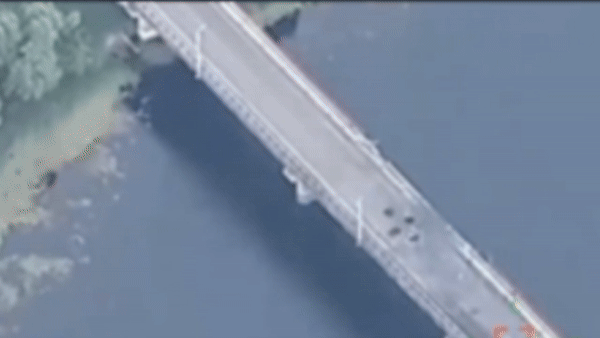
Ukrainian forces destroy important bridge in Russia’s Kursk region
On Friday, August 16, Ukrainian forces destroyed a bridge over the Seym River near the town of Glushkovo in Russia’s Kursk region.
Ukrainian Air Force
Ukrainian forces have apparently pushed a third bridge in their ongoing campaign to cut supply lines in the Russian region of Kursk, which they occupy. President Volodymyr Zelenskyy appealed on Monday to allies to allow the use of their weapons for deeper advances into Russian territory.
Moscow reported damage from a Ukrainian attack on a third bridge over the Sejm River, which flows through the province where the warring nations have been battling each other since Ukraine’s shocking incursion across the northeastern border with Russia on August 6. Kyiv has not commented on the attack on the third bridge, but one of its commanders confirmed the first two.
Speaking to the heads of Ukrainian diplomatic missions in Dnipro on Monday, Zelensky said that Kyiv’s armed forces had taken control of 92 settlements and more than 1,270 square kilometers in Kursk. The invasion had displaced nearly 200,000 Russians from their homes.
While Moscow pulled troops from the Ukrainian battlefields to defend Kursk, President Vladimir Putin has so far failed to respond overwhelmingly to Russia’s largest invasion since World War II. Zelensky cited this as evidence that supportive countries like the United States should not be afraid to provoke President Vladimir Putin by supplying Ukraine with weapons that could land on Russian soil.
A week in Kursk: Maps and satellite images show the development of the Ukrainian incursion as Russia builds trenches and Ukraine destroys bridges
“Putin’s reaction to the Kursk operation shows that there is no reasonable reason to deny us real long-range capabilities,” Zelensky said. “The situation on the Donetsk front (in eastern Ukraine) is such that any further delay by our partners in this matter will effectively support Russia’s attack potential.”
Zelensky also said the lack of such capabilities was the only obstacle to stopping the Russian advance on the front lines. Russia has claimed about 20 percent of Ukraine’s territory in the east since the war began, and Zelensky said on Sunday the attack on Kursk was intended as a means of creating a “buffer zone” to prevent attacks from Moscow.
“If our partners lifted current restrictions on the use of weapons on Russian territory,” he said, “we would not need to physically invade the Kursk region to protect our border communities and eliminate Russia’s potential for aggression.”
Developments:
∎ Ukraine is struggling to hold off the Russian advance in the eastern Ukrainian city of Pokrovsk, a transport hub. Serhiy Dobriak, head of the local military administration, said the Russians had come within 10 kilometers of the outskirts of the city.
∎ Denmark announced it would provide Ukraine with a 20th military aid package worth $115 million, saying the weapons could be used in Ukraine’s fighting in Kursk, the Kyiv Independent reported.
No peace talks for now, but pro-Russian conditions still on the table
The Ukrainian invasion of Kursk will hamper peace talks, which have been going nowhere anyway, but will not persuade Putin to back down from his recent proposal to end the war, presidential adviser Yuri Ushakov said on Monday.
Ushakov said the spectacular cross-border attack was an embarrassment for the Russian military and would bring negotiations to a halt indefinitely. The duration would depend on further developments, including what happened on the battlefield.
In June, Putin declared that the war would end if Ukraine gave up its desire to join NATO and agreed to Russia’s demands for the annexation of the four eastern provinces. However, Kyiv rejected this proposal out of hand.
Ushakov said those conditions were still on the table. “But at this point, of course, it would be completely inappropriate to enter into any negotiation process.”
India’s Modi visits Kyiv weeks after hugging Putin
Indian Prime Minister Narendra Modi, who continued to buy Russian oil during the war despite Western opposition, will visit Kyiv on Friday, Zelensky’s office confirmed on Monday.
The visit of an Indian head of state to Ukraine, the first since the two countries established diplomatic relations over 30 years ago, was described as “groundbreaking and historic” by the Indian Foreign Ministry.
It is also a balancing act by Modi, who was heavily criticized when he hugged Putin during a July 8-9 visit to Moscow. That visit coincided with the Russian attack on a Ukrainian children’s hospital that left dozens dead. Modi, who has taken a largely neutral stance on the war, implicitly blamed Putin for the attack.
“This is an important visit which we expect to strengthen our relations across a range of sectors,” said Tanmaya Lal, India’s foreign minister for the West, adding that the war would be one of the topics of discussion.
“Sustainable peace can only be achieved through options that are acceptable to both sides,” Lal said. “And that can only be a negotiated solution.”
Contributors: Reuters
